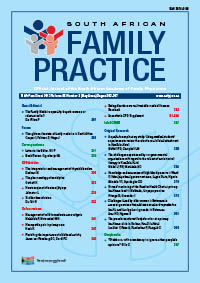A qualitative exploratory study: Using medical students’ experiences to review the role of a rural clinical attachment in KwaZulu-Natal
Keywords:
Rural clinical attachment, Family Medicine rotation, medical students, expereinces, Force Field Model
Abstract
Objectives: There are challenges when it is considered that a main role of a rural clinical attachment for medical students is to encourage students to return after graduation to practise in rural areas. This view may lead to the relative neglect of other potential valuable roles with regard to rural exposure. This paper draws on the Force Field Model of teacher development to describe medical students’ experiences, illustrate the complexity of interacting factors during rural exposure, caution that experiences cannot be predicted and highlight the positive incentives of a rural clinical attachment. Design: The design was explorative, descriptive and qualitative. Setting: The study setting was a district hospital in rural KwaZulu-Natal. Subjects: The participants were four final-year medical students who had completed a compulsory attachment during their Family Medicine rotation. Outcome measures: Data were collected using photo elicitation and analysed using the Force Field Model. Results: The participants felt that overall the experience was positive. The effect of biography and contextual forces were not as strong as expected. Institutional forces were important and programmatic forces tended to have a negative effect on experiences. The participants particularly enjoyed being acknowledged and felt empathy for the difficult tasks of doctors. Conclusion: The potential role of a clinical attachment may go beyond attracting students to practise in rural areas. The experience can be beneficial, irrespective of where the student decides to practise after graduation. There is a need for a review of the rural attachment curriculum and paedagogy. Caution should be used when screening medical students for suitability to work in rural areas prior to rural exposure.
Published
2012-10-11
Section
Original Research
By submitting manuscripts to SAFP, authors of original articles are assigning copyright to the South African Academy of Family Physicians. Copyright of review articles are assigned to the Publisher, Medpharm Publications (Pty) Ltd, unless otherwise specified. Authors may use their own work after publication without written permission, provided they acknowledge the original source. Individuals and academic institutions may freely copy and distribute articles published in SAFP for educational and research purposes without obtaining permission.

